A-Level Music Technology is a rewarding but complex subject blending creativity with technical skill. Understanding its challenges and seeking personalized guidance can be the key to unlocking your full potential.
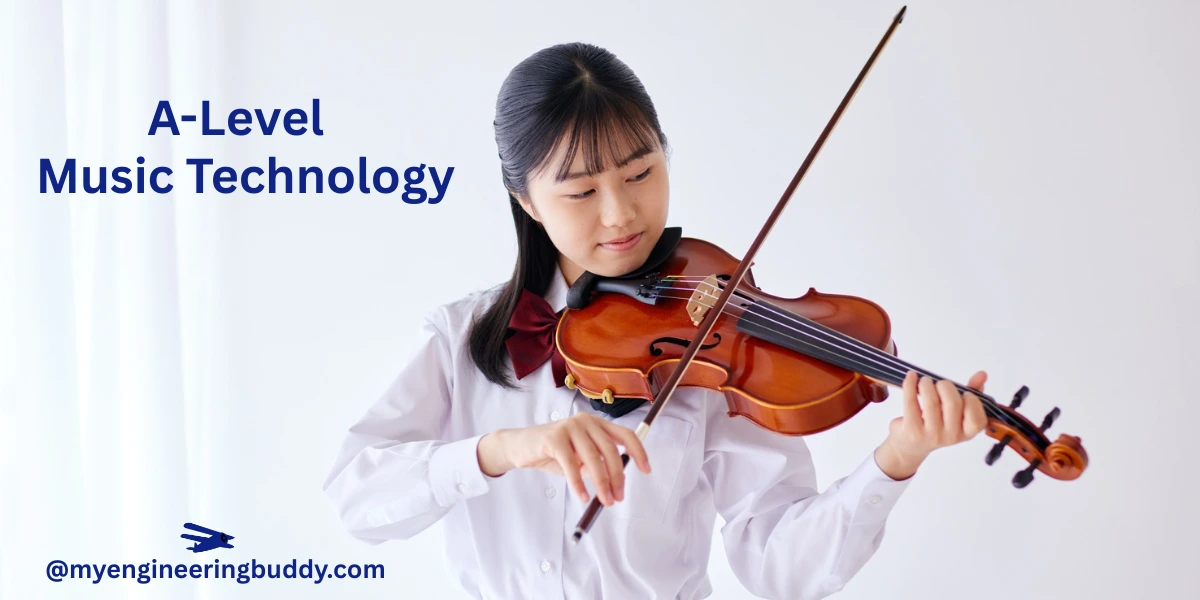
The First Beat Drops: Sarah’s Story
Sarah had always been the “music kid.” From strumming a guitar in her bedroom to creating playlists that told a story, sound was her language. So, when she signed up for A-Level Music Technology, she thought she was just taking the next logical step. She imagined herself effortlessly creating tracks like her favorite producers, the music flowing from her mind to the speakers.
The reality, however, was a bit different. She found herself staring at a Digital Audio Workstation (DAW) screen that looked more like an airplane cockpit than a creative canvas. Terms like compression, EQ, and signal flow felt like a foreign language. Her passion was still there, burning bright, but a wall of technical jargon stood in its way. Sarah’s story isn’t unique. It’s a journey many students embark on when they dive into the fascinating world of music technology.
This course is more than just a subject; it’s a gateway to the modern music industry. But navigating that gateway often requires a guide. Let’s explore what this A-Level is all about, the common hurdles students face, and how the right support can transform frustration into fluency.
What is A-Level Music Technology, Really?
When people hear “music class,” they often picture pianos and sheet music. A-Level Music Technology shatters that stereotype. It’s a dynamic and contemporary qualification that equips students with the practical and theoretical skills needed to create, record, and produce music to a professional standard.
It’s where art meets science, and raw creativity is shaped by technical precision.
The Core Components: A Symphony in Four Parts
The syllabus might seem complex at first, but it essentially revolves around four interconnected pillars. Here is how they fit together:
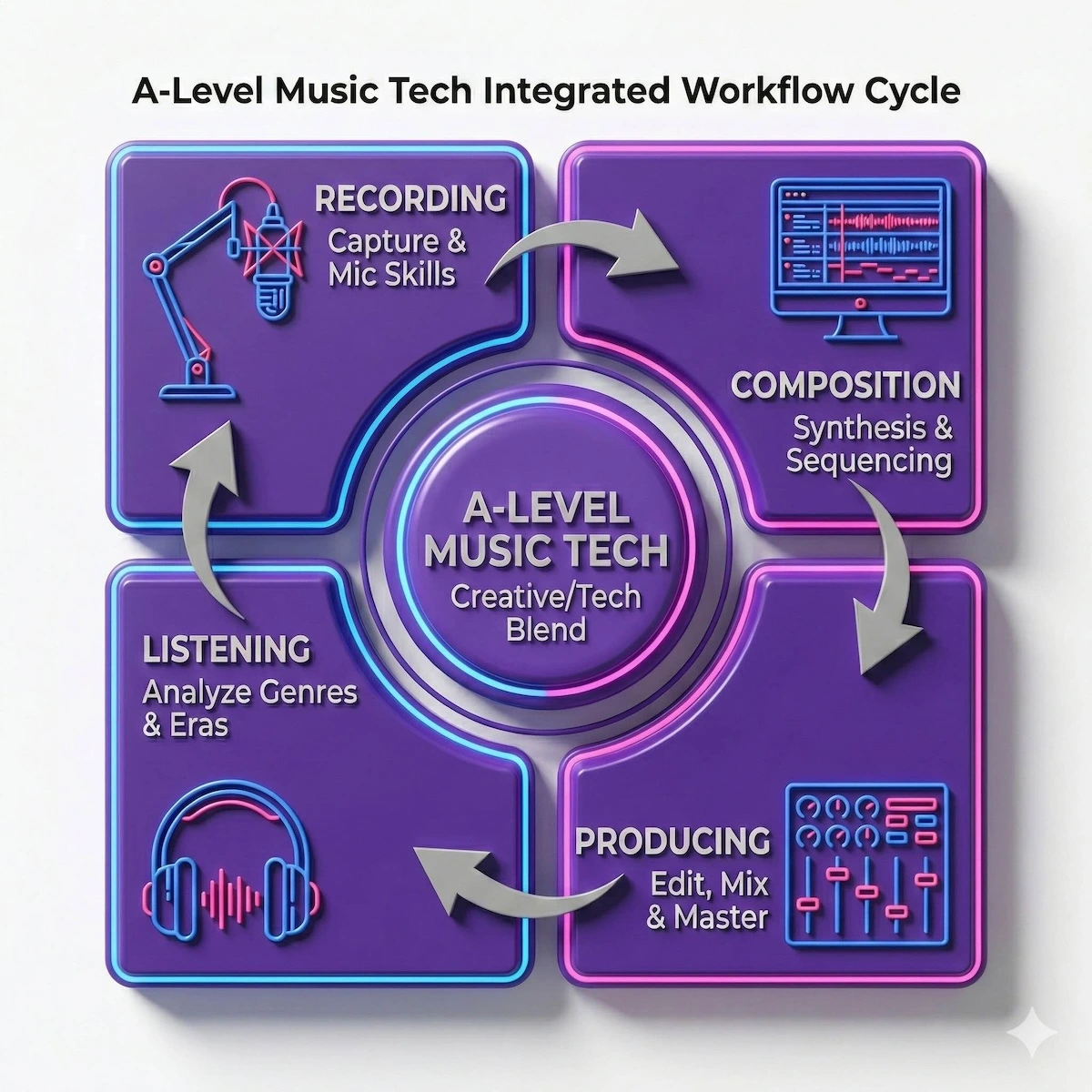
Mastering A-Level Music Technology requires balancing these four critical skill sets.
Notice how these components aren’t isolated; your listening skills directly inform your production choices.
Most A-Level Music Technology courses, like the popular one from Edexcel, are built around four key areas:
- Recording: This is all about capturing sound. Students learn microphone techniques, how to record live instruments and vocals, and manage a multi-track recording session. It’s a hands-on process that demands both a good ear and a steady hand.
- Technology-Based Composition: Here, students use technology as their instrument. They create their own music from scratch using DAWs, synthesizers, samplers, and various effects. This is where their unique musical voice comes to life.
- Listening and Analyzing: This component involves critically listening to a wide range of music, from 1950s rock and roll to modern electronic dance music. Students learn to identify production techniques, historical context, and the specific sonic elements that define different eras and genres.
- Producing and Analyzing: This is where it all comes together. Students are given pre-recorded audio files and must edit, mix, and master them into a finished track. It’s a test of their technical skills, creative decision-making, and understanding of professional production standards.
The entire process is a delicate dance between the creative and the technical. It’s this unique blend that makes the subject so exciting, but also incredibly challenging. The right A-Level Music Technology teaching focuses on balancing these two aspects, ensuring students don’t just learn which buttons to press, but why they’re pressing them.
The Common Hurdles: When the Rhythm Feels Off
Like any advanced subject, A-Level Music Technology has its share of challenges. For students like Sarah, these hurdles can feel overwhelming, turning a passion project into a source of stress.
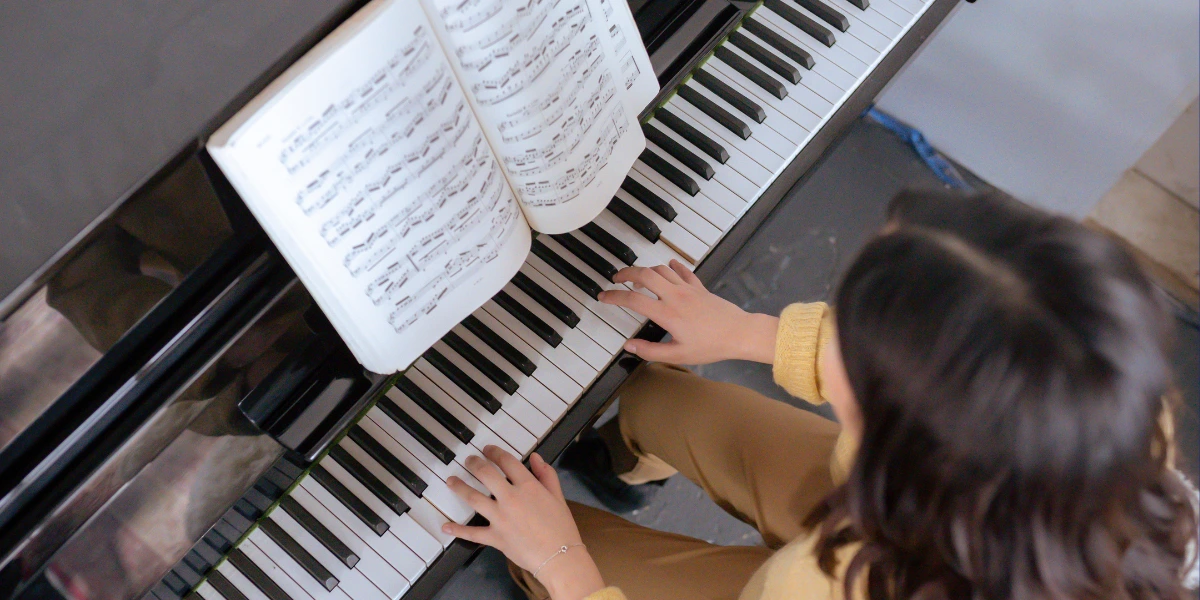
The Technology Learning Curve
Modern DAWs like Logic Pro X, Ableton Live, or Pro Tools are incredibly powerful, but they are also deeply complex. Each one has its own workflow and a seemingly endless array of menus and plugins. For a beginner, simply navigating the software can be a major roadblock, let alone using it creatively.
This is often where students first seek out A-Level Music Technology homework help. They might understand the musical idea in their head, but struggle to translate it into the DAW. Getting stuck on a technicality can completely derail a creative session.
It is easy to get lost in the technical weeds, but shifting your approach can make a massive difference. Let’s look at how to flip these common struggles into wins:
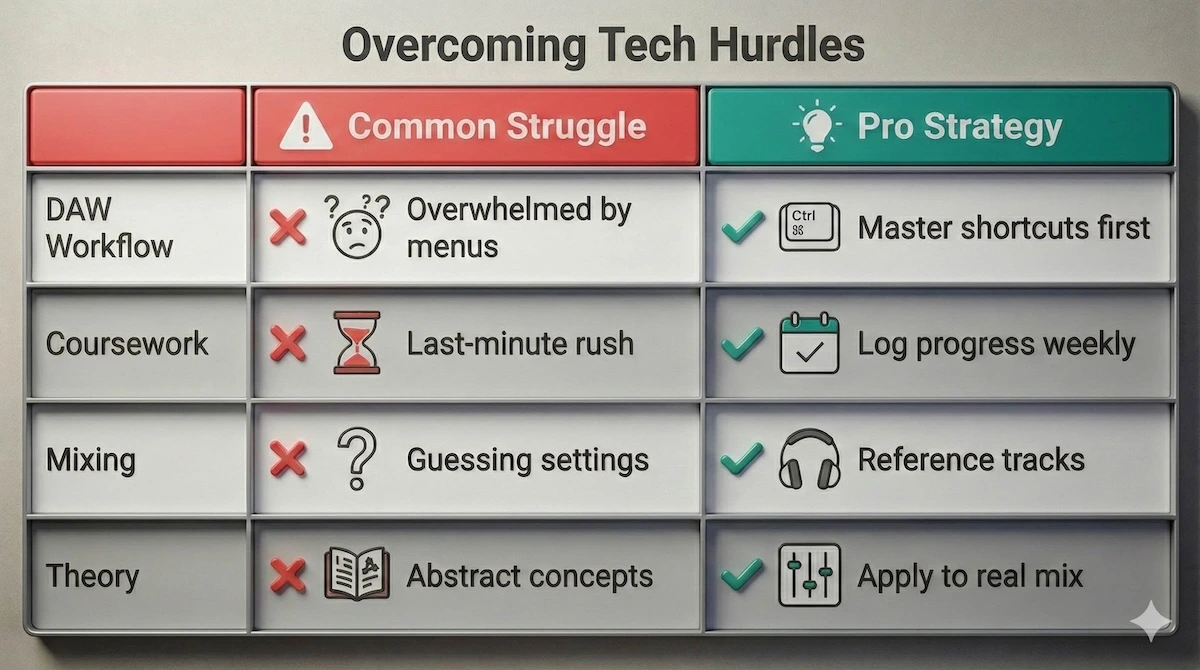
Shift your mindset from struggling with the tech to mastering the tools with these pro strategies.
By adopting these professional habits early, you turn the DAW from an obstacle into a powerful instrument.
The Weight of Coursework
A significant portion of the final grade comes from coursework—the recording logs, compositions, and mixing projects. These are not simple one-night assignments. They are long-term projects that require planning, execution, and constant refinement.
Imagine spending weeks recording a band for your project, only to find the drum microphones weren’t placed correctly and the sound is unusable. This is where high-stakes pressure comes in. Many students find that ongoing A-Level Music Technology assignment help provides a crucial safety net, offering feedback and guidance at each stage of the project, not just at the end.
Bridging Theory and Practice
Understanding what a compressor does is one thing. Knowing how to apply it subtly to a vocal track to make it sit perfectly in a mix is another entirely. The course demands that students apply theoretical knowledge of acoustics and production principles in a practical, musical way.
This gap between knowing and doing is where a great A-Level Music Technology teacher can make a world of difference, demonstrating techniques in a way that textbooks simply can’t. Without that guidance, students can spend hours tweaking settings with no real progress.
Finding Your Mentor: The Power of a Great Tutor
Let’s go back to Sarah. After a month of feeling stuck, her parents suggested she find some extra help. She was skeptical at first, but decided to give it a try. She found an expert who could provide A-Level Music Technology tutoring online.
Her first session was a revelation. Her tutor, a former studio engineer, didn’t just give her answers. He shared his screen, walked her through the DAW, and explained the “why” behind every technique. He turned the intimidating “airplane cockpit” into a creative playground. He became more than a teacher; he was a mentor.
What Makes an Effective Tutor?
When you look to hire a A-Level Music Technology tutor, you’re looking for a unique combination of skills:
- Industry Experience: Someone who has worked in a real studio or as a producer brings invaluable real-world context to the curriculum.
- Curriculum Mastery: They need to know the specific requirements of the exam board, from coursework logging to the listening exam format.
- Patience and Communication: The ability to explain complex topics in a simple, understandable way is the hallmark of a great educator.
- Personalized Approach: A good tutor tailors their teaching style to the individual student. Whether you need help with music theory or the technical side of mixing, the support should fit your needs.
Not all tutors are created equal. Use this decision flow to ensure you find a mentor who actually fits your learning style:
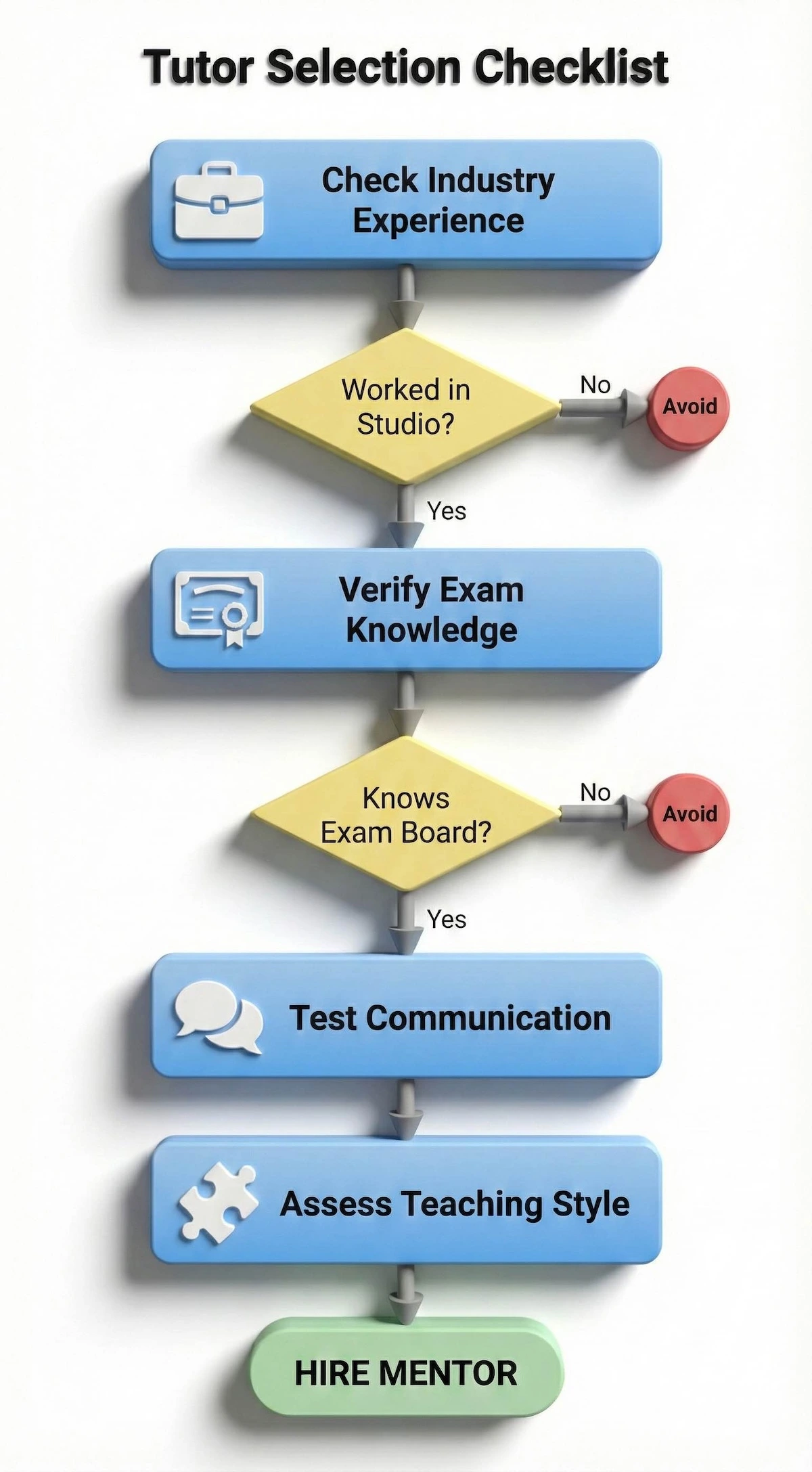
Follow this checklist to ensure you find a tutor who can bridge the gap between theory and industry practice.
Taking the time to verify these credentials ensures you get a mentor who can truly guide your creative growth.
The rise of online learning has made it easier than ever to connect with top-tier educators. Searching for an A-Level Music Technology tutor online opens up a global pool of talent, allowing students in the UK, USA, or the Gulf to connect with an expert who perfectly matches their requirements.
An effective A-Level Music Technology tutor doesn’t do the work for the student. They act as a guide, providing the tools and confidence for the student to succeed on their own. They can turn a frustrating A-Level Music Technology hw help session into a moment of breakthrough.
From Classroom to Career: The Future is Sound
Why go through all this effort? Because the skills learned in A-Level Music Technology are more in-demand than ever. The creative industries are a massive economic force. According to a 2023 UK government report, the creative industries contributed an estimated £124.6 billion to the UK economy in 2022, highlighting the sector’s significant impact.
This isn’t just a fun subject; it’s a direct pathway to a viable and exciting career. Graduates go on to become:
- Music Producers: Shaping the sound of albums and singles for artists.
- Sound Engineers: Working in live sound for concerts or in studios for recording sessions.
- Composers for Media: Creating music for films, television shows, and video games.
- Game Audio Designers: Crafting the immersive soundscapes of video games.
- Post-Production Specialists: Editing and mixing audio for film and TV.
The discipline, problem-solving, and project management skills acquired during the A-Level are transferable to countless other fields as well. It teaches you to manage a complex project from start to finish—a skill that is valuable in any profession.
Where do these skills actually lead? The following map shows the direct line from your A-Level studies to professional industry roles:
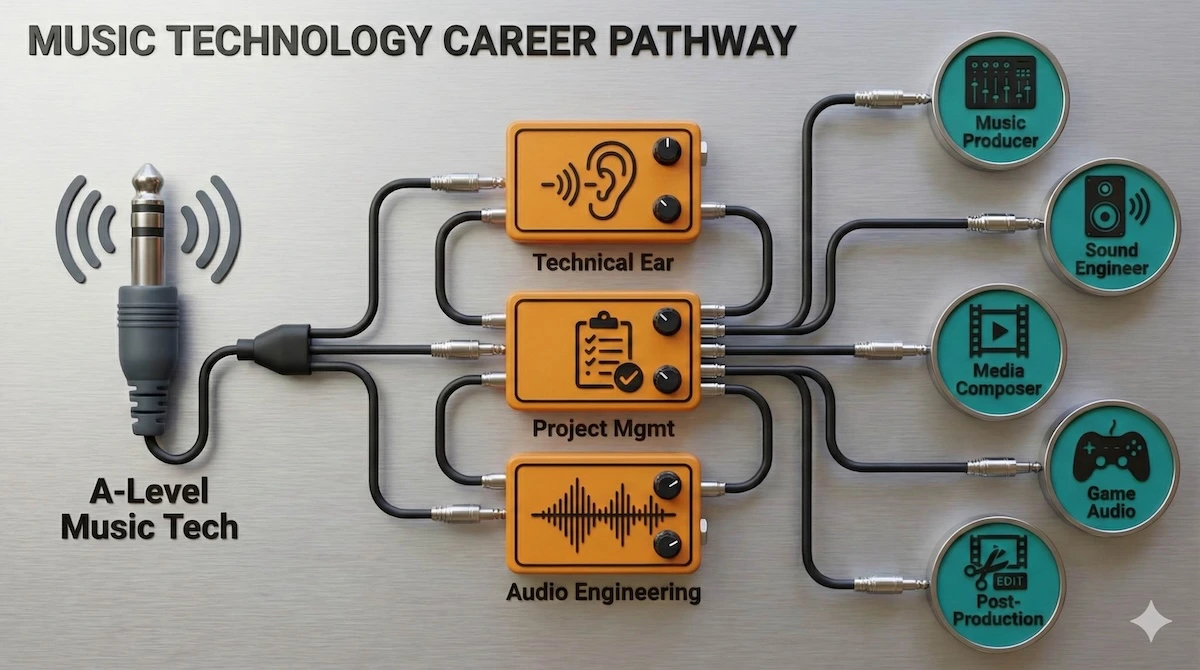
Your A-Level skills are the “input” that feeds into diverse and exciting career “outputs” across the creative industries.
Whether you aim for the gaming industry or live sound, the technical foundation you build now is the key to unlocking these doors.
Your Next Track: How to Get the Right Support
If you’re a student feeling like Sarah did, or a parent watching your child struggle with the technical demands of the course, know that support is available. Specialized A-Level Music Technology tutoring is designed to address the specific challenges of this curriculum.
Instead of endless, frustrating searches for answers online, a dedicated session with an expert can solve a problem in minutes that might have taken hours to figure out alone. Whether it’s for regular guidance throughout the year or intensive help on a final project, this personalized support can be the difference between a passing grade and a distinction.
The goal of a great tutoring experience is to build independence. The tutor is there to guide you, empower you, and give you the confidence to trust your own ears and creative instincts. They help you master the tools so you can forget about the technology and focus on what truly matters: the music.
A-Level Music Technology is a journey. It’s challenging, technical, and demands dedication. But with the right passion and the right guide, it can be one of the most rewarding experiences of your academic life, setting the stage for a future filled with sound and creativity.
Frequently Asked Questions (FAQs)
Q1. Is A-Level Music Technology a respected A-Level?
Yes, it is a fully respected A-Level that is accepted by universities for a wide range of degree courses, especially in creative and technical fields.
Q2. Do I need to play an instrument to take this course?
While performance is not a core component, a basic understanding of music theory and some instrumental skill can be very beneficial for the composition elements.
Q3. What software will I need to use at home?
You will need access to a Digital Audio Workstation (DAW); schools often use Logic Pro X, Cubase, or Ableton Live, and student versions are sometimes available.
Q4. Can an online tutor really help with a hands-on subject?
Absolutely, through screen sharing and high-quality audio streaming, an online tutor can guide you through software and listen to your projects in real-time.
Q5. How much does A-Level Music Technology tutoring typically cost?
Expert tutoring often ranges from $20 to $40 per hour, depending on the complexity of the topic and the level of study.
Q6. What is the biggest challenge in this A-Level?
Most students find that bridging the gap between theoretical concepts and their practical application in a complex DAW is the biggest challenge.
******************************
This article provides general educational guidance only. It is NOT official exam policy, professional academic advice, or guaranteed results. Always verify information with your school, official exam boards (College Board, Cambridge, IB), or qualified professionals before making decisions. Read Full Policies & Disclaimer , Contact Us To Report An Error

